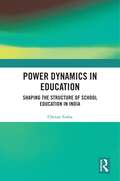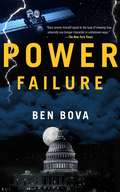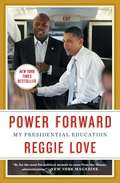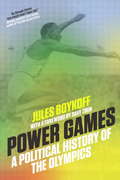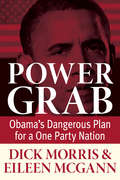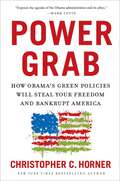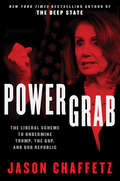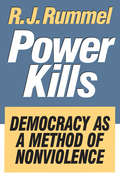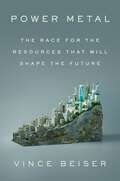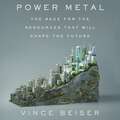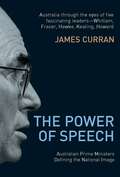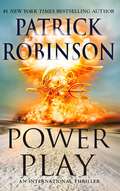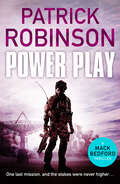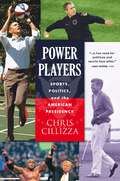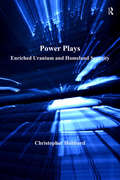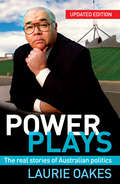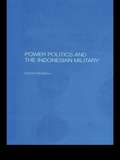- Table View
- List View
Power Dynamics in Education: Shaping the Structure of School Education in India
by Chetan SinhaThe educational domain provides a platform for social mobility and social change. This book investigates the new National Educational Policy (NEP) to understand how it can bring social justice and transform education in a meaningful way to match the imagination of students from diverse groups. The author discusses matters of emotion and authority in education and argues for the need for educational psychology which takes into account the self-conscious emotions of students and teachers. The book reflects on important topics such as critical pedagogy, dehumanization, power in education through bricolage, legitimacy in education all within the context of critical educational psychology. Through research and observations, it discusses the social-psychological aspect of stereotyping, othering and prejudices in the educational domain. The book will be of interest to students, teachers and researchers working on education, school education, sociology of education, politics of education, and educational psychology. It will also be useful for academicians, educators, policymakers, schoolteachers, and those interested in the politics of education.
Power Failure: A Jake Ross Political Thriller (Jake Ross Series #3)
by Ben BovaAward-winning writer Ben Bova returns with Power Failure, another tense political thriller starring Jake Ross, science advisor to Senator Frank Tomlinson, as they continue their complex power maneuvers in this near future science fiction novel. Dr. Jake Ross came to Washington to try to make a difference, but he’s learned the only way to get something done in Washington, assuming your ideals survive the corrosive atmosphere, is to gather power. Ross has gathered a great deal, riding in the wake of Frank Tomlinson. But now Tomlinson has decided to shoot for the moon. If they win, they get it all. If they lose, the game is over for Jake Ross. In the Power trilogy, Bova's vision of a future powered by solar satellite transmission is tantalizingly within reach.Jake Ross Series#1 Power Play#2 Power Surge#3 Power FailureAt the Publisher's request, this title is being sold without Digital Rights Management Software (DRM) applied.
Power Forward
by Reggie LoveEvery path to adulthood is strewn with missteps, epiphanies, and hard-earned lessons. Only Reggie Love's, however, went through the White House by way of Duke University's Cameron Indoor Stadium. Mentored by both Coach Krzyzewski and President Obama, Love shares universal insights learned in unique circumstances, an education in how sports, politics, and life can define who you are, what you believe in, and what it takes to make a difference.Power Forward tells the story of the five years Love worked as a personal assistant to Senator Obama as a candidate for president, and President Obama, and it is a professional coming of age story like no other. What the public knows was well put by Time magazine in 2008: "[Love's] official duties don't come close to capturing Reggie's close bond with Obama, who plays a role that is part boss and part big brother." What the public doesn't know are the innumerable private moments during which that bond was forged and the President mentored a malleable young man. Accountability and serving with pride and honor were learned during unsought moments: from co-coaching grade school girls basketball with the president; lending Obama his tie ahead of a presidential debate; managing a personal life when no hour is truly his own; being tasked with getting the candidate up in the morning on time for long days of campaigning. From his first interview with Senator Obama, to his near-decision not to follow the president-elect to the White House, to eventually bringing LeBron, Melo, D-Wade, and Kobe to play with the President on his forty-ninth birthday, Love drew on Coach K's teachings as he learned to navigate Washington. But it was while owning up to losing (briefly) the President's briefcase, figuring out how to compete effectively in pick-up games in New Hampshire during the primary to secure support and votes, babysitting the children of visiting heads of state, and keeping the President company at every major turning point of his historic first campaign and administration, that Love learned how persistence and passion can lead not only to success, but to a broader concept of responsibility.
Power Games: A Political History of the Olympics
by Dave Zirin Jules BoykoffA timely, no-holds barred, critical political history of the modern Olympic GamesThe Olympics have a checkered, sometimes scandalous, political history. Jules Boykoff, a former US Olympic team member, takes readers from the event's nineteenth-century origins, through the Games' flirtation with Fascism, and into the contemporary era of corporate control. Along the way he recounts vibrant alt-Olympic movements, such as the Workers' Games and Women's Games of the 1920s and 1930s as well as athlete-activists and political movements that stood up to challenge the Olympic machine.From the Trade Paperback edition.
Power Grab
by Dick Morris Eileen McgannAmerica is at a crossroads - we can choose the path of the Founding Fathers and keep a strong constitutional government that thrives on our bipartisan spirit, or opt for President Barack Obama's dream: a nation ruled by one political party with a far left agenda. That's the dire warning from best-selling author and political insider Dick Morris and his co-author Eileen McGann in their compelling new book Power Grab. The authors make a convincing case that Obama has an overarching strategy in pushing his liberal agenda, one that grab power from our traditional and bipartisan institutions in favor of a single party: his Democratic Party.
Power Grab: How Obama's Green Policies Will Steal Your Freedom and Bankrupt America
by Christopher C. HornerNo matter how President Obama spins his proposed environmental and energy policies, they all amount to the same thing: a power grab. In his new book, Power Grab, bestselling author Christopher Horner shows how Team Obama wants to take critical decisions about our energy and environment out of your hands and hand them over to politicians, extreme environmental groups, and foreign governments. From determining which kind of energy is "clean," to subjecting us to extreme environmental treaties, to forcing us to comply with economically detrimental cap-and-trade legislation, Horner shows how Obama and the liberals in Congress don't just want to run the government; they want to run your life. A shocking look at how the Obama administration wants to impose mandates, raise taxes, and subjugate our authority to international organizations such as the United Nations, Power Grab reveals an out-of-control government that will make America—and the lives of its citizens—worse.
Power Grab: Political Survival through Extractive Resource Nationalization (Business and Public Policy)
by Paasha MahdaviFor rulers whose territories are blessed with extractive resources -- such as petroleum, metals, and minerals that will power the clean energy transition -- converting natural wealth into fiscal wealth is key. Squandering the opportunity to secure these revenues will guarantee short tenures, while capitalizing on windfalls and managing the resulting wealth will fortify the foundations of enduring rule. This book argues that leaders nationalize extractive resources to extend the duration of their power. By taking control of the means of production and establishing state-owned enterprises, leaders capture revenues that might otherwise flow to private firms, and use this increased capital to secure political support. Using a combination of case studies and cross-national statistical analysis with novel techniques, Mahdavi sketches the contours of a crucial political gamble: nationalize and reap immediate gains while risking future prosperity, or maintain private operations, thereby passing on revenue windfalls but securing long-term fiscal streams.
Power Grab: The Liberal Scheme to Undermine Trump, the GOP, and Our Republic
by Jason ChaffetzA New York Times Bestseller.How much damage will the Democrats do to our republic in the name of saving it?In the years he served on and eventually chaired the United States House Committee on Oversight and Government Reform, Jason Chaffetz gained crucial insight into the inner workings of D.C. Things were bad then, but during the Trump administration, liberals have reached a new level of hysteria and misconduct.Democrat anger has grown so irrational that it has burst through the constitutional guardrails which protect our institutions and our republic. While they constantly label the right “fascist,” the left imposes policies which suppress speech, limit freedom, and empower federal bullies. In Power Grab, Chaffetz pulls back the curtain on the world of hypocrisy, political intrigue, and procedural malfeasance that is Washington D.C. With stories you won't read anywhere else, he shows how the left weaves false narratives, drums up investigations in search of a crime, and refuses to direct congressional oversight towards its appropriate target: the government. Democrats weaponize nonprofit advocacy groups and monetize partisan anger to line the pockets of their political allies. They use “voter enrollment” as a smokescreen to hide their plans to destabilize free elections and seek to politicize federal agencies like the Federal Election Commission, the IRS, and the Department of Justice.It shouldn’t be this way. Democrats have abandoned the wisdom set forth in the Constitution for short-term political wins. Power Grab shows the lengths to which Democrats will go to maintain their grip on power, and how the only thing that will stop them is a return to our founding principles.
Power Hungry: Women of the Black Panther Party and Freedom Summer and Their Fight to Feed a Movement
by Suzanne CopeTwo unsung women whose power using food as a political weapon during the civil rights movement was so great it brought the ire of government agents working against them In early 1969 Cleo Silvers and a few Black Panther Party members met at a community center laden with boxes of donated food to cook for the neighborhood children. By the end of the year, the Black Panthers would be feeding more children daily in all of their breakfast programs than the state of California was at that time. More than a thousand miles away, Aylene Quin had spent the decade using her restaurant in McComb, Mississippi, to host secret planning meetings of civil rights leaders and organizations, feed the hungry, and cement herself as a community leader who could bring people together—physically and philosophically—over a meal. These two women's tales, separated by a handful of years, tell the same story: how food was used by women as a potent and necessary ideological tool in both the rural south and urban north to create lasting social and political change. The leadership of these women cooking and serving food in a safe space for their communities was so powerful, the FBI resorted to coordinated extensive and often illegal means to stop the efforts of these two women, and those using similar tactics, under COINTELPRO--turning a blind eye to the firebombing of the children of a restaurant owner, destroying food intended for poor kids, and declaring a community breakfast program a major threat to public safety.But of course, it was never just about the food.
Power Kills: Democracy as a Method of Nonviolence
by R. J. RummelThis volume, newly published in paperback, is part of a comprehensive effort by R. J. Rummel to understand and place in historical perspective the entire subject of genocide and mass murder, or what he calls democide. It is the fifth in a series of volumes in which he offers a detailed analysis of the 120,000,000 people killed as a result of government action or direct intervention.In Power Kills, Rummel offers a realistic and practical solution to war, democide, and other collective violence. As he states it, "The solution...is to foster democratic freedom and to democratize coercive power and force. That is, mass killing and mass murder carried out by government is a result of indiscriminate, irresponsible Power at the center."Rummel observes that well-established democracies do not make war on and rarely commit lesser violence against each other. The more democratic two nations are, the less likely is war or smaller-scale violence between them. The more democratic a nation is, the less severe its overall foreign violence, the less likely it will have domestic collective violence, and the less its democide. Rummel argues that the evidence supports overwhelmingly the most important fact of our time: democracy is a method of nonviolence.
Power Laws in Firm Size and Openness to Trade: Measurement and Implications
by Andrei A. Levchenko Julian Di Giovanni Romain RancièreA report from the International Monetary Fund.
Power Metal: The Race for the Resources That Will Shape the Future
by Vince BeiserThe powerful ways the metals we need to fuel technology and energy are spawning environmental havoc, political upheaval, and rising violence - and how we can do better.An Australian millionaire's plan to mine the ocean floor. Nigerian garbage pickers risking their lives to salvage e-waste. A Bill Gates-backed entrepreneur harnessing AI to find metals in the Arctic.These people and millions more are part of the intensifying competition to find and extract the minerals essential for two crucial technologies: the internet and renewable energy. In Power Metal, Vince Beiser explores the Achilles' heel of "green power" and digital technology - that manufacturing computers, cell phones, electric cars, and other technologies demand skyrocketing amounts of lithium, copper, cobalt, and other materials. Around the world, businesses and governments are scrambling for new places and new ways to get those metals, at enormous cost to people and the planet.Beiser crisscrossed the world to talk to the people involved and report on the damage this race is inflicting, the ways it could get worse, and how we can minimize the damage. Power Metal is a compelling glimpse into this disturbing yet potentially promising new world.
Power Metal: The Race for the Resources That Will Shape the Future
by Vince BeiserThe powerful ways the metals we need to fuel technology and energy are spawning environmental havoc, political upheaval, and rising violence - and how we can do better.An Australian millionaire's plan to mine the ocean floor. Nigerian garbage pickers risking their lives to salvage e-waste. A Bill Gates-backed entrepreneur harnessing AI to find metals in the Arctic.These people and millions more are part of the intensifying competition to find and extract the minerals essential for two crucial technologies: the internet and renewable energy. In Power Metal, Vince Beiser explores the Achilles' heel of "green power" and digital technology - that manufacturing computers, cell phones, electric cars, and other technologies demand skyrocketing amounts of lithium, copper, cobalt, and other materials. Around the world, businesses and governments are scrambling for new places and new ways to get those metals, at enormous cost to people and the planet.Beiser crisscrossed the world to talk to the people involved and report on the damage this race is inflicting, the ways it could get worse, and how we can minimize the damage. Power Metal is a compelling glimpse into this disturbing yet potentially promising new world.
Power Of Speech: Australian Prime Ministers Defining the National Image
by James CurranThe subjects of this book are five fascinating prime ministers—Gough Whitlam, Malcolm Fraser, Bob Hawke, Paul Keating and John Howard—and how they view Australia.Until the 1960s, our nation believed itself to be British. Then, during a decade of momentous change, this concept of our national identity collapsed. It was buried by the forces of cultural and political renewal; by disturbing and exciting developments in Asia; and by a dawning recognition that the global era of colonial power was over.The result was a crisis of national meaning reflected in public debates about multiculturalism, Australia's relationships with its Asian neighbours, the dispossession of indigenous Australians, and the nation's involvement in war. In recent years, our political leaders have played a conspicuous role in the controversy.In The Power of Speech, James Curran explores the end of the idea of British Australia, and how successive prime ministers have attempted to assert personal, and often competing, visions of Australian nationalism in its place. This highly original study of prime ministerial rhetoric exposes the sources of our most powerful leaders' beliefs about Australia.
Power Play
by Ben BovaDr. Jake Ross, a university astronomer, wants nothing more than to teach a few classes each semester and continue on his research. However, he is being aggressively recruited to be the science advisor to Frank Tomlinson, an ambitious politician with his eye on the U. S. Senate. Tomlinson is in need of an edge that will allow him to defeat his opponent at the polls, and Dr. Ross can contribute just that: MHD. MHD, or magnetohydrodynamics, is a new innovation that will allow electricity to be generated efficiently and cheaply. The senate is essentially guaranteed if Tomlinson can deliver unlimited energy to voters at less than half the price of nuclear power. But MHD is still in its infancy, and although the outlook is extremely promising there are great - and deadly - risks. The incumbent senator will not give up his seat without a fight, and as Dr. Ross discovers, the world of politics carries its own dangers. Nothing has prepared Dr. Ross for the extreme tactics that desperate and powerful people are willing to use. Power Play is a timely thrill ride by Ben Bova, one of science fiction's most respected novelists.
Power Play
by Patrick RobinsonMack Bedford must devise a plan to stop the Russians before they and their cyber weaponry reach the Chinese borderOCothe launch site of their master plan. "
Power Play (An FBI Thriller #18)
by Catherine Coulter#1 New York Times–bestselling author Catherine Coulter returns with the newest full-throttle adventure in the FBI series featuring Dillon Savich and Lacey Sherlock. Natalie Black, the U.S. ambassador to the Court of St. James, has returned to Washington, her job in jeopardy. Her fiancé, George McCallum, Viscount Lockenby, has died in a car accident, and mysterious rumors begin that she’s responsible begin to surface: she broke off the engagement and, heartbroken, he killed himself. Then someone tries to force her off the M-2 outside London. Again, rumors claim it was a sympathy ploy. When she returns to the United States, she’s nearly killed when a car tries to mow her down while she’s out for a run. No one believes her except FBI Special Agent Davis Sullivan.Meanwhile someone is following Sherlock. A stalker? Then someone tries to shoot her from the back of a motorcycle, but the assailant gets away. Sherlock next gets a call from an Atlanta mental hospital warning her that Blessed Backman has escaped. This is not good news. Blessed is a talented psychopath out for revenge against the agents, primarily Sherlock, whom his dying mother begged him to kill since she and Savich brought down her cult.How to find out who’s trying to kill the ambassador to the U.K.? How can they get their hands on Blessed Backman before he succeeds and kills Sherlock? The clock is ticking and the danger intensifies . . .
Power Play (The Mack Bedford Military Thrillers)
by Patrick RobinsonAn ex–Navy SEAL must thwart a nuclear attack on US soil in this military thriller by a #1 New York Times–bestselling author. A highly volatile nuclear world looms. Israel has obliterated the deep underground nuclear weapons facility built by Iran, and the United States is nerve-wracked about the stance of a defiant North Korea. Against this backdrop, the Russians plan a cyber warfare offensive on the US. In addition to a ballistic strike on the National Security Agency at Fort Meade, they plan to jam the top-secret electronic access key to America&’s missile launch system—the nuclear football. If successful, Russia would establish a temporary dominance over the United States. As this geopolitical battle rages in the shadows, behind locked doors, it is up to a Mossad spymaster based in Moscow to avert the Russian scheme. He calls upon the one man he believes can succeed, US Navy SEAL Commander Mack Bedford. It is now up to Mack to prevent the Russians&’ cyber weaponry from reaching the American mainland, at which point it would be impossible to stop . . . Perfect for fans of James Swallow, Tom Clancy, and Stephen Leather.Praise for the writing of Patrick Robinson&“One of the crown princes of the beach-read thriller.&” —Stephen Coonts, New York Times–bestselling author of The Disciple &“Patrick Robinson has tapped into our fear.&” —Torquay Herald Express&“Robinson [crafts] a fast-paced, chilling, yet believable tale.&” —San Francisco Examiner
Power Players: Sports, Politics, and the American Presidency
by Chris CillizzaA colorful look at how modern presidents play sports, have used sports to play politics, and what our fan-in-chief can often tell us about our national pastimes. POWER PLAYERS tells all the great stories of presidents and the sports they played, loved and spectated as a way to better understand what it takes to be elected to lead a country driven by sports fans of all stripes. While every modern president has used sports to relate to Joe Q. Public, POWER PLAYERS turns the lens around to examine how sports have shaped our presidents and made for some amazing moments in White House history, including: Dwight Eisenhower played so much golf he had a putting green built outside the Oval Office!. (He also almost died on a golf course while in office.) How John F. Kennedy&’s touch-football games with family were knowing plays to polish the Camelot mystique. People might not have related to the aloof and awkward Richard Nixon but, hey, he would bowl a few frames just like them. Ronald Reagan didn&’t just play the part of &“The Gipper&” for the silver screen, but truly adopted the famous footballer&’s never-say-die persona. George H.W. Bush once ran a horseshoe league from the White House – with a commissioner and brackets! (He would later claim to have come up with the fan expression, &“You da man.&”) Bill Clinton&’s Arkansas Razorback fandom was so intense that he could be found shouting at the referees from a box at the basketball national championship game in 1994. George W. Bush&’s not only owned the Texas Rangers but also threw out the most iconic first pitch ever in the 2001 World Series. What really went down when Barack Obama played pickup hoops with the North Carolina Tarheels. (He later won the state by .3 percent of the vote.) Donald Trump is the only president ever featured in a professional wrestling storyline—and everything real and fake that went with that. In the pages of POWER PLAYERS, a love of sports shines through as the key to understanding who these presidents really were and how they chose to play by the rules, occasionally bluff or cheat, all the while coaching the country into a few quality wins and some notorious losses.
Power Plays
by Allison CarnegieCoercive diplomacy - the use of threats and assurances to alter another state's behavior - is an indispensable to international relations. Most scholarship has focused on whether and when states are able to use coercive methods to achieve their desired results. However, employing game-theoretic tools, statistical modeling, and detailed case study analysis, Power Plays builds and tests a theory that explains how states develop strategies of coercive diplomacy, how their targets shield themselves from these efforts, and the implications for interstate relations. Focusing on the World Trade Organization, Power Plays argues that coercive diplomacy often precludes cooperation due to fears of exploitation, but that international institutions can solve these problems by convincing states to eschew certain tools for coercive purposes.
Power Plays: Enriched Uranium and Homeland Security (Homeland Security)
by Christopher HubbardA comprehensive exploration of how national and state security policy is effected by the production, storage, transportation, safeguarding, export and use of enriched uranium - and, by extension, plutonium. A wide range of geopolitical, security and technical issues are examined, as are the challenges presented to national and global governance. This book contributes to a new understanding of one of the most serious security implications inherent in the current rapid growth in nuclear power generation. It assesses attempts made to deal with the latent dangers to Homeland Security posed by potential misuse of enriched uranium and plutonium, considering both the chances for success, and the costs of failure.
Power Plays: The Real Stories of Australian Politics
by Laurie OakesLaurie Oakes is the most influential political journalist in Australia - if he says something has happened, the rest of the media (especially the Canberra Press Gallery) believe him and report it as news. He is respected by both political insiders and the wider public. He has worked in Canberra as a political reporter for 39 years and reported on 19 federal elections. He regularly finds the big story way ahead of everyone else. Currently the national political editor for the Nine Network he is the man who interviews all the big names. From 1987 to December 2007 he wrote a weekly column for the Bulletin and since its demise he has been writing a column for the Saturday Daily Telegraph in Sydney and the Herald Sun in Melbourne. POWER PLAYS is a selection of 150 of the very best and most timeless of Laurie Oakes' columns.
Power Plays: Win or Lose--How History's Great Political Leaders Play the Game
by Dick MorrisStrategies politicians have used to gain astounding success--or failures.
Power Politics and State Formation in the Twentieth Century
by Bridget CogginsFrom Kurdistan to Somaliland, Xinjiang to South Yemen, all secessionist movements hope to secure newly independent states of their own. Most will not prevail. The existing scholarly wisdom provides one explanation for success, based on authority and control within the nascent states. With the aid of an expansive new dataset and detailed case studies, this book provides an alternative account. It argues that the strongest members of the international community have a decisive influence over whether today's secessionists become countries tomorrow and that, most often, their support is conditioned on parochial political considerations.
Power Politics and the Indonesian Military
by Damien KingsburyThroughout the postwar history of Indonesia, the military have played a key role in the politics of the country and in imposing unity on a fragmentary state. The collapse of the authoritarian New Order government of President Suharto weakened the state and the armed forces briefly lost their grip on control of the archipelago. However, under President Megawati, the military has again begun to assert itself, and re-impose its heavy hand on control of the state, most notably in the fracturing outer provinces. Based on extensive original research, this book examines the role of the military in Indonesian politics. It looks at the role of the military historically, examines the different ways it is involved in politics, and considers how the role of the military might develop in what is still an uncertain future.
